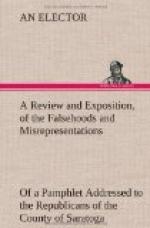As Mr. Gladstone wrote in 1890, “can anyone say we should have treated Ireland as we have done had she lain not between us and the ocean, but between us and Europe?”
In introducing the scheme of mild Home Rule termed the Councils Bill in 1907, Mr. Birrell prefaced it with the remark that “separation was unthinkable—save in the event of some great world cataclysm.” World cataclysms up to this have not reached Ireland—England intervened too well. She has maintained her hold by sea power. The lonely Andromeda saw afar off the rescuing Perseus, a nude figure on the coast of Spain or France, but long ere his flight reached her rock-bound feet she beheld him fall, bruised and mangled, and devoured by the watching sea monster.
Had Italy been placed as Ireland is, cut off from all external succour save across a sea held by a relentless jailor, would she have been to-day a free people, ally of Austria on terms of high equality?
The blood shed by the founders of modern Italy would all have been shed in vain—that blood that sanctified the sword of Garibaldi—had it not been for the selfish policy of Louis Napoleon and the invading armies of France. Italy, no more than Ireland, could have shaken herself free had it not been for aid from abroad. The late Queen Victoria saw clearly the parallel, and as hereditary custodian of Ireland, Her Majesty protested against the effort then being made to release Italy from an Austrian prison, when she herself was so hard put to it to keep Ireland in an English jail. Writing to her Prime Minister on July 25th, 1848, Her Majesty said:—
“The Queen must tell Lord John (Russell) what she has repeatedly told Lord Palmerston, but without apparent effect, that the establishment of an entente cordiale with the French Republic, for the purpose of driving the Austrians out of their dominions in Italy would be a disgrace to this country. That the French would attach the greatest importance to it and gain the greatest advantage from it, there can be no doubt of. But how will England appear before the world at the moment she is struggling for her supremacy in Ireland?...” and on Oct. 10th following Her Majesty wrote to her uncle, the first King of the Belgians (who owed his new minted crown to the Belgian people depriving the Dutch Sovereign of his “lawful possessions”) in the following memorable words:
“Really it is quite immoral, with Ireland quivering in our grasp, and ready to throw off her allegiance at any moment, for us to force Austria to give up her lawful possessions. What shall we say if Canada, Malta, etc., begin to trouble us? It hurts me terribly.” (Page 237, Queen Victoria’s letters, published by order of His Majesty, King Edward VII.)
It hurt Ireland much more terribly, that failure to throw off the hand that held her “quivering in our grasp,” so soon to stretch her “a corpse upon the dissecting table.”




